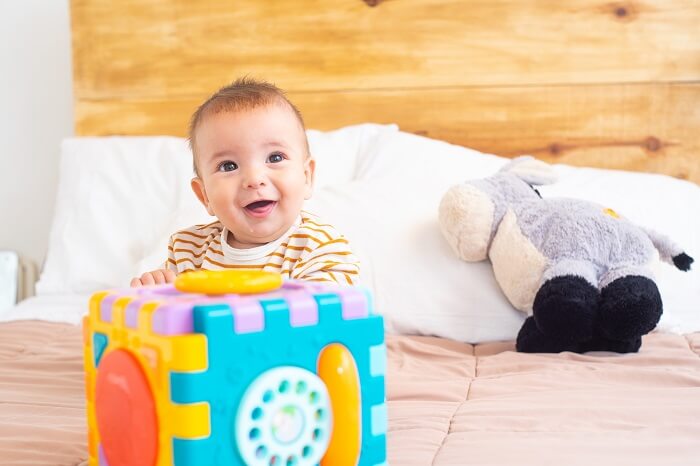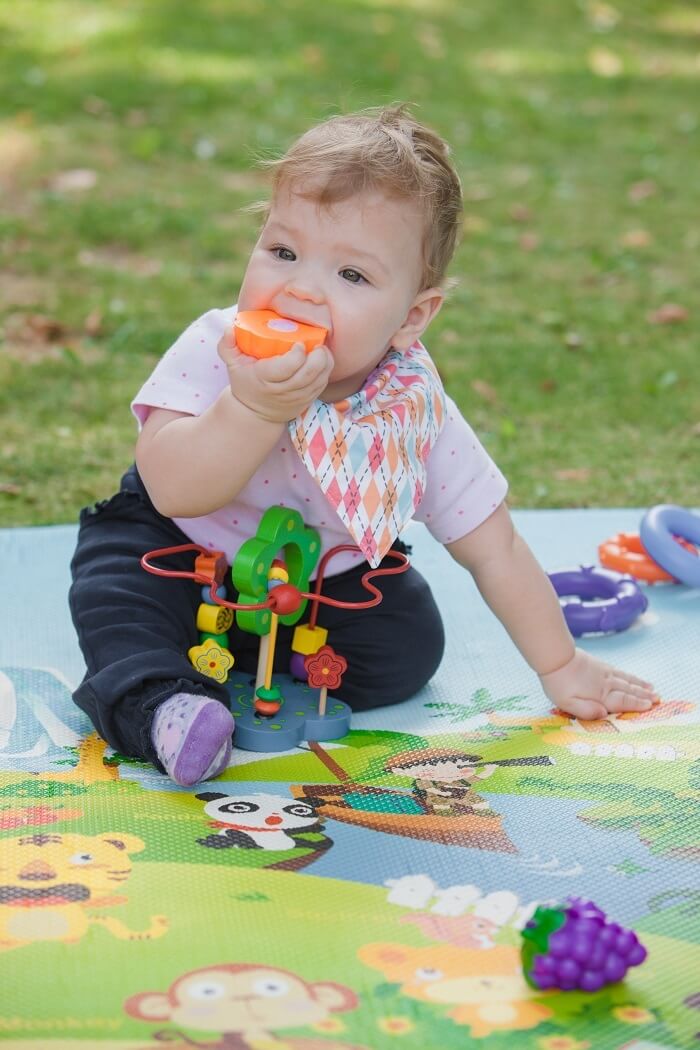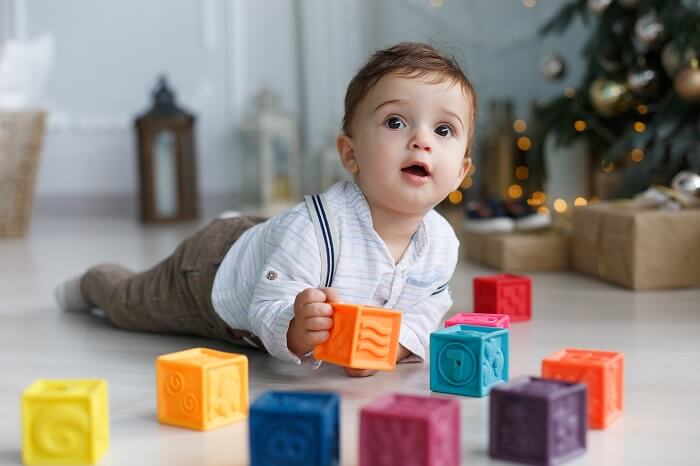9 Month Old Baby Development Activities
As your baby reaches the 9-month mark, you may notice significant changes in their development. This is an exciting time as they continue to explore their environment and develop new skills. Engaging your 9-month-old in various activities can help stimulate their senses, boost cognitive growth, enhance motor skills, and foster social and emotional development. In this article, we will explore a range of development activities suitable for a 9-month-old baby.

Motor Skills Development Activities
Encouraging Crawling
Crawling is an essential milestone for babies as it helps strengthen their muscles and develop coordination. Create a safe space where your baby can freely move around and encourage them to crawl by placing toys just out of their reach. You can also get down on all fours and crawl alongside them, providing motivation and showing them how it's done.
Playing with Blocks
Building towers with soft blocks is an excellent activity for developing your baby's fine motor skills. Encourage them to stack the blocks and knock them down, promoting hand-eye coordination and manual dexterity. This activity also introduces them to the concepts of cause and effect.
Rolling a Ball
Rolling a soft ball back and forth with your baby helps develop their hand-eye coordination and gross motor skills. Sit facing each other and take turns rolling the ball. You can make it more exciting by using different-sized balls and introducing gentle throwing and catching.
Sensory Exploration Activities
Water Play
Water play is a fantastic sensory experience for babies. Fill a shallow basin with lukewarm water and let your baby splash and explore with their hands and feet. Supervise them closely at all times and ensure the water level is safe. Introduce different water-safe toys and containers for added engagement.
Texture Exploration
Create a sensory board or tray with various textures for your baby to explore. Use materials like smooth fabric, rough sandpaper, bumpy foam, or soft fur. Let them touch and feel the different textures, stimulating their tactile senses. Always monitor your baby during texture play to ensure their safety.
Sensory Bottles
Sensory bottles are easy to make and provide visual and auditory stimulation for your baby. Fill a clear plastic bottle with materials like colored water, glitter, beads, or small objects. Secure the cap firmly and ensure it is tightly sealed. As your baby shakes the bottle, they will be captivated by the swirling colors and sounds, promoting sensory exploration.
Cognitive Development Activities
Peek-a-Boo
Playing peek-a-boo is not only entertaining but also helps develop your baby's cognitive skills. Cover your face with your hands or a cloth, then quickly reveal yourself and say, "Peek-a-boo!" This game teaches object permanence and enhances their understanding of hiding and revealing.
Object Permanence Games
To further reinforce the concept of object permanence, engage your baby in simple games. Hide a toy under a blanket or behind your back and encourage them to find it. This activity challenges their memory and problem-solving abilities while providing a sense of accomplishment when they successfully uncover the hidden object.
Shape Sorting
Introduce shape-sorting toys to promote cognitive development. These toys typically consist of different shapes and corresponding holes. Encourage your baby to place the shapes into the correct holes, fostering hand-eye coordination, shape recognition, and problem-solving skills.
Language Development Activities
Reading Aloud
Reading aloud to your baby is an excellent way to introduce them to language and stimulate their linguistic abilities. Choose colorful picture books with simple stories or rhymes. Point to the pictures, use expressive voices, and engage them in the storytelling process. This activity not only develops their vocabulary but also fosters a love for books and reading.
Singing Songs and Rhymes
Singing songs and reciting nursery rhymes not only entertains your baby but also enhances their language development. Sing familiar songs and nursery rhymes with repetitive lyrics. Encourage your baby to mimic sounds or gestures, promoting early communication skills. This activity also improves their listening and memory abilities.
Baby Sign Language
Introduce simple baby sign language gestures to facilitate communication with your 9-month-old. Start with basic signs like "more," "all done," or "milk." Consistently use the signs while speaking, and encourage your baby to imitate them. Baby sign language can help reduce frustration and support early language development.
Social and Emotional Development Activities
Playdates and Socializing
Engaging in playdates or socializing with other babies provides valuable opportunities for social interaction and development. Arrange playdates with friends or join parent-child groups where your baby can interact with peers. These interactions promote social skills, sharing, and cooperation.
Mirror Play
Place a child-safe mirror in front of your baby and watch as they explore their reflection. Encourage them to smile, make funny faces, or imitate movements. Mirror play helps develop self-awareness, social-emotional skills, and facial recognition.
Emotion Recognition
Show your baby pictures or illustrations of different facial expressions representing various emotions. Point to each picture and label the emotion, such as happy, sad, or surprised. This activity helps them develop emotional awareness and the ability to recognize and understand different feelings.

Physical Play and Movement Activities
Tummy Time
Tummy time is crucial for strengthening your baby's neck, back, and arm muscles. Place a blanket on the floor and lay your baby on their stomach, supporting their upper body with your hands. Encourage them to lift their head, reach for toys, and explore their surroundings. Gradually increase the duration of tummy time as their muscles grow stronger.
Baby Yoga
Gentle baby yoga exercises can promote flexibility, balance, and coordination. Guide your baby through simple stretches and movements, such as bending their knees to their chest or bringing their hands to their feet. Always ensure that the movements are gentle and within your baby's comfort zone.
Dance and Music Time
Engage in playful dance and music sessions with your baby.During dance and music time, sway to the rhythm of lively songs or soothing melodies. Hold your baby's hands and encourage them to move their body, clap their hands, or stomp their feet. This activity promotes gross motor skills, coordination, and a sense of rhythm.
Sensory Play and Stimulation
Sensory Bins
Create sensory bins by filling shallow containers with materials like rice, pasta, or sand. Add objects with different textures and colors, such as plastic animals or foam shapes. Allow your baby to explore the materials with their hands, encouraging tactile stimulation and sensory exploration.
Playdough
Playing with soft playdough offers a variety of sensory experiences for your baby. Provide them with non-toxic playdough in different colors. Let them squeeze, poke, and shape the playdough, promoting fine motor skills, creativity, and tactile stimulation. Always supervise your baby to ensure they do not put the playdough in their mouth.
Finger Painting
Engage your baby in the artistic world of finger painting. Use non-toxic, baby-safe paint in vibrant colors and provide large sheets of paper or a washable painting mat. Guide your baby's hand to make simple strokes or handprints. This activity enhances sensory exploration, fine motor skills, and creativity.
Conclusion
Engaging your 9-month-old baby in development activities is not only fun but also essential for their growth and learning. Through motor skills development activities, sensory exploration, cognitive stimulation, language development exercises, social and emotional interactions, physical play, and sensory play, you can support their overall development. Remember to adapt the activities to your baby's individual pace and preferences, and always prioritize their safety and well-being.
By providing a stimulating and nurturing environment, you can enhance your baby's developmental journey and create beautiful bonding experiences along the way.
FAQs (Frequently Asked Questions)
Q: What are the benefits of sensory play for a 9-month-old baby?
Sensory play offers numerous benefits for a 9-month-old baby. It stimulates their senses, promotes cognitive development, enhances motor skills, encourages exploration and curiosity, and supports their overall growth and learning.
Q: How can I encourage my 9-month-old to crawl?
To encourage crawling, create a safe and stimulating environment where your baby can freely explore. Place enticing toys just out of their reach, get down on all fours and crawl alongside them, and provide plenty of tummy time to strengthen their muscles. Gradually, they will develop the confidence and skills needed to crawl.
Q: Is it normal for my 9-month-old to not have teeth yet?
Yes, it is normal for babies to have a wide range of tooth eruption timelines. Some babies may start teething as early as 4 months, while others may not have any teeth until after their first birthday. If you have concerns, consult your pediatrician.
Q: Can I start introducing solid foods to my 9-month-old?
Around 9 months of age, you can begin introducing solid foods alongside breastfeeding or formula feeding. Start with mashed or pureed fruits, vegetables, and iron-fortified cereals. Gradually increase the variety and texture of foods as your baby shows readiness.
Q: What are some signs of developmental delays in a 9-month-old?
If you notice significant delays or concerns in your baby's development, it is advisable to consult your pediatrician. Signs of potential developmental delays may include limited or no babbling, no attempts to crawl or move, lack of response to sounds or gestures, or difficulty maintaining eye contact. Early intervention can be beneficial in addressing any developmental concerns.


